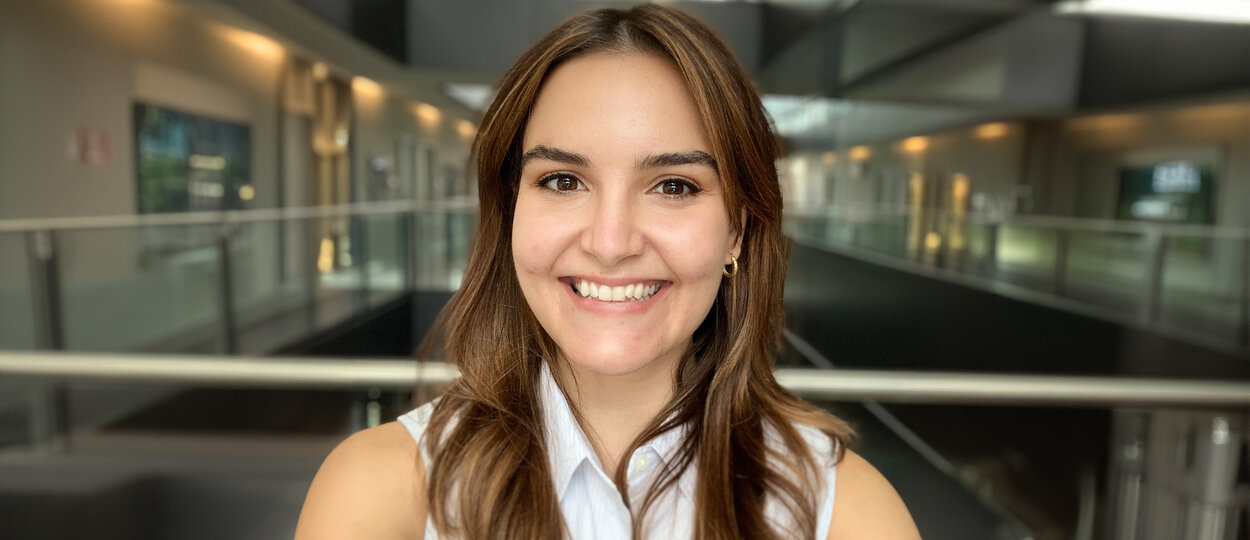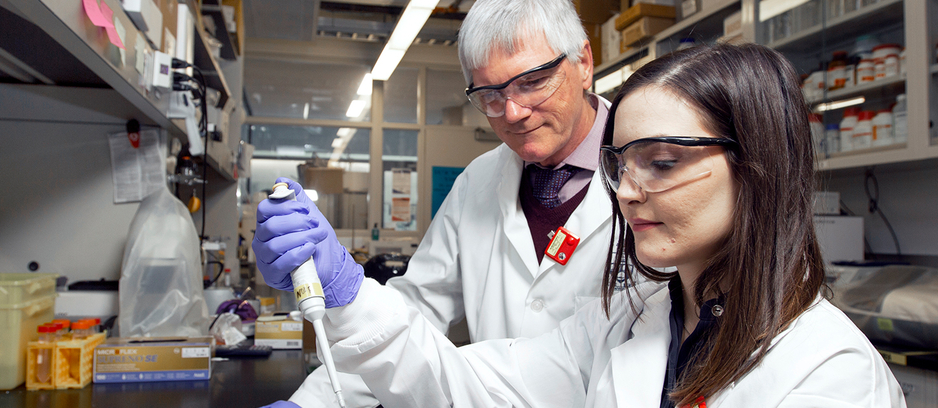From student leader to research scientist, exposure to broad pharmaceutical science education helps prepare students for success, says Facca
Valerie Facca has spent much of the last decade studying at U of T’s Leslie Dan Faculty of Pharmacy, first as an undergraduate student in the pharmaceutical chemistry program followed by a PhD in the department of pharmaceutical sciences with Professor Raymond Reilly.
Facca’s graduate research was recently recognized with the Association of Faculties of Pharmacy (AFPC) Graduate Student Research Award for a research paper describing a radiolabelled antibody to treat a model of recurrent triple-negative breast cancer.
Throughout her education at the Faculty, she participated in student groups, notably the American Association of Pharmaceutical Sciences (AAPS) U of T Student Chapter organize seminars and symposiums for the Centre for Pharmaceutical Oncology.
After successfully defending her thesis this spring, she is now working as a research scientist at a pharmaceutical start-up company in Montreal, where she is applying many of the same skills gained during her PhD work to do preclinical research in metabolic diseases.
We spoke with Facca about her experience at the Leslie Dan Faculty of Pharmacy and how her education at the Faculty has helped prepare her for her research career.
How did you become interested in pharmaceutical chemistry?
I was always interested in many different fields—medicine, drug delivery, chemistry, biology, and physiology. The pharmaceutical chemistry program really encompassed all of them and was a great fit for me. The professors in that program were so welcoming and established a great community, so I had a great experience.
Why did you decide to pursue a graduate degree with Professor Reilly?
I did an undergraduate summer research project and a research thesis at the Leslie Dan Faculty of Pharmacy, which were my first introduction to research at the Faculty. I became really interested in Professor Reilly’s research to use both antibodies and nanoparticles to make theranostics for imaging and therapy, and I thought this was a really interesting field within cancer medicine. Professor Reilly is a world-class scientist in this area. Through the combination of great research and great people, I knew it was going to be a good fit.
What was your PhD research was about?
I worked in breast cancer research, particularly in a subtype called triple-negative breast cancer, which is very aggressive. It has a high rate of progression and recurrence, so we really need new tools to both diagnose and track this cancer, but also to treat it.
In Professor Reilly’s lab, we address this by creating theranostics, using pharmaceuticals for both therapy and imaging cancer. In my project, I created a radiolabelled antibody for both imaging breast cancer in mice and treating them with a highly localized form of radiation therapy.
I was able to create a model of recurrent breast cancer that is a better representation of this aggressive disease to evaluate new therapies. I used a radiolabelled antibody to image metastases, track progression and treat recurrent breast cancer in mice. Using a combination of this radiolabelled antibody with standard local treatment, we were able to improve the survival of these mice.
What does it mean to you to receive the AFPC Graduate Student Research Award for your research?
It’s a real honour. I am really passionate about this research, I believe that theranostics offer the potential for high-precision cancer therapy with improved safety. This project was the sum of many years developing the radiopharmaceutical, the model and studying the pharmacology. It was a privilege to work on this project with Professor Reilly and my coauthors Zhongli Cai, Anthony Ku and Constantine Georgiou and build on the previous work of talented alumni.
What were some of the highlights of your time at the Leslie Dan Faculty of Pharmacy?
The Faculty has a great community. It’s a really supportive group of students and professors, and I think everyone really celebrates each other’s success, which is amazing to see in research and in grad school. The professors are amazing, both in terms of quality and in their passion for teaching and training students.
Working with Professor Reilly was a fantastic experience, and I’m so glad I had the opportunity to be mentored by him, as he’s an excellent teacher. In his lab I received thorough training in radiopharmaceutics and an introduction to the preclinical process in a very supportive environment.
How will your education from the Leslie Dan Faculty of Pharmacy help your career?
The Faculty offers a comprehensive education in pharmaceutical sciences, and as students, we get exposed to a broad range of pharmacy fields. We also had group seminars with external researchers and professors, and it was great to be able to look at all different aspects of pharmacy research and hear new perspectives.
The Faculty has world-class scientists who represent a lot of different areas, both in academia and industry, and they prepared us well for a research career in either of those settings.
More News
Image

Dean Lisa Dolovich reappointed for second term
Professor Lisa Dolovich has been reappointed for a second term as Dean of the Leslie Dan Faculty of Pharmacy, University of Toronto, effective July 1, 2025, to December 30, 2030.
Read More
Image

Pharmacy Summer Camp gives high school students insight into pharmacy profession
A new summer camp based at the faculty will give high school students a range of experiences in pharmacy and pharmaceutical sciences.
Read More
Image

Team GloveLift wins 2025 Business Plan Competition with innovative medical device
PharmD students win $5,000 prize for their innovative medical device concept aimed at improving patient care.
Read More

